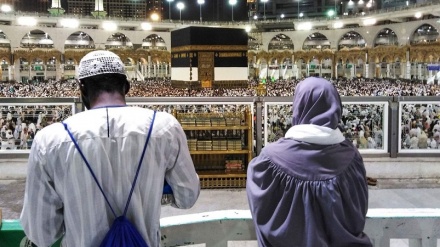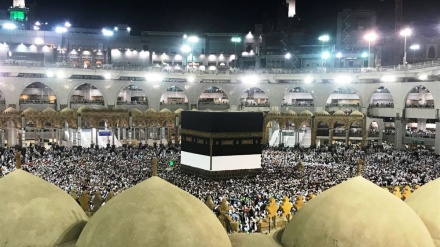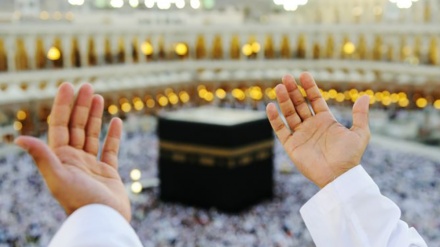Hajj, Symbol of Obedience to God (10)
In the Name of God, the All-Merciful, the All-compassionate, welcome to the 10th and last episode of interesting accounts of the Hajj pilgrimage – a spiritual journey which is obligatory once in a lifetime for every able-bodied person who has the financial means to undertake it without become a pauper in doing so.
Here is a brief description of how the Hajj was performed in the correct manner by Imam Zayn al-Abedin (AS), the 4th Infallible Successor of Prophet Mohammad (blessings of God upon him and his progeny).
The 4th Imam, as the Son and Successor of Imam Husain the Martyr of Karbala, used to tell Muslims: “When you perform the Hajj or the Umrah, your bodies become sound, your daily bread becomes ample, your faith becomes righteous, and you are sufficient for the provisions of the people and of your families.”
He would say: “The Hajj pilgrim is forgiven, the Garden is surely for him... The angels intercede (with God) for the one who walks briskly between as-Safa and al-Marwa.”
He also urged the Muslims to honour the pilgrims when they returned from the Sacred House of Allah, saying: “Express joy when the pilgrims return (from Mecca), shake hands with them, and show respect to them; you thus have a share in their reward.”
Now, we will briefly present some aspects of his performance of the Hajj.
The 4th Imam performed the Hajj on foot twenty-five times like his father Imam Husain and uncle Imam Hasan Mojtaba (peace upon them), travelling without a mount from his hometown Medina to Mecca. It took him twenty days to perform the Hajj to the House of Allah.
In addition, twenty times he performed the Hajj riding on his she-camel, and took great care of the animal. The historians said: He never whipped the camel.
Ibrahim bin Ali said: I performed the Hajj with the 4th Imam. His she-camel was moving slowly, hence he pointed to it with a stick and then he withdrew it and said: Woe if there was a retaliation (in the next world)!
He displayed the highest level of mercy, pity, and gentleness to the animal, to the extent he never whipped or frightened his she-camel. Ill-treatment of even an animal would bring punishment in afterlife.
When Imam Zayn al-Abedin (AS) intended to perform the Hajj to the Sacred House of Allah, the reciters of the holy Qur'an and the religious scholars would accompany him, for they acquired from him sciences, knowledge, wise sayings, and good manners.
They learnt from him the correct manner of performing the Hajj, the rules of religion, and all aspects of Islamic law, for there was no one in his time, according to the consensus of the historians and narrators, more knowledgeable than him in the precepts of the holy Qur’an and the Sunnah or practice and behaviour of the Prophet of Islam.
The Imam made perfect preparations for performing the Hajj and the Umrah. His provisions were meagre but healthy food such as almonds, sugar, soured and sugared fine flour. Once his sister procured for him excellent food on which she spent thousands of dirhams, but when he arrived at al-Hurrah, he ordered the food to be distributed among the poor and the needy.
When the Imam arrived at one of the places appointed for the ritual consecration for wearing the Ehram (such as Masjid ash-Shajara), he intended to recite the “talabiya”, that is, “Allahomma Labbayk”, which means: O Allah, here I am at your service. At once, his skin turned pale and he felt unable to recite the “talabiya”. He was asked: Why don't you recite it?
Despite being infallible, he trembled with fear of Allah and said: “Suppose I say “Labbayk”, but the response might be: “La Labbayk”, which means, You are not at My service.
So great was the Imam’s cognizance of God the Omnipresent, when he finally recited the “talabiya”, he fainted. Such a state happened several times in his life, till the completion of the Hajj.
The 4th Imam would supplicate to God Almighty beside the Hajar al-Aswad or the Sacred Black Stone at the corner of the holy Ka’ba. When he finished the circumambulation of the holy Ka’ba, he would turn towards Sacred Black Stone, look at the sky and say: “O Allah, make me enter Heaven through Your mercy.”
Whenever Imam Zayn al-Abedin (AS) looked at the “mizab ar-rahmah” or the rainwater spout atop the roof of the Ka’ba, he would say: “O Lord, make me immune from the fire through Your mercy; heal me of illness; allow me to attain my provision through lawful means, protect me from the evil of the sinners amongst the jinn and men, and the wickedness of the sinners from among the Arabs and non-Arabs.”
It was the habit of the 4th Imam that after completing the Hajj rituals, such as circumambulation around the holy Ka’ba and the brisk walking between the hillocks of Safa and Marwa, he would come to pray under the Spout of Mercy.
Once the famous Iranian ascetic Tawous bin Kaysan al-Yamani saw him at the spot underneath the Spout of Mercy, standing in prayer, supplicating to Allah, and weeping in awe of Allah the Omnipresent but Unseen. When he finished his prayers, Tawous approached him, saying: I have seen you in this state of humility despite the fact that you possess three exceptional qualities, which no one else has, and these make you safe from Divine punishment. First you are the great grandson son of the Messenger of Allah, may Allah bless him and his family. Second you have the intercession in the Divine Court of your illustrious ancestor. And third is Allah's mercy upon your.
The Imam gently answered: Tawous, my lineal descent from Allah's Prophet ought not to make me fearless of Allah, nor the intercession of my ancestor in the Divine Court, should remove fear of Allah from me, and neither the fact He is All-Merciful; haven’t you read the holy Qur’an where Allah the Exalted says: “There shall be no ties of relationship between them, nor shall they ask of each other.” As for the intercession of my grandfather, Allah the Most High, says: “They do not intercede except for him who He approves.” As for Allah's mercy, Allah says: “Allah's mercy is close to the benefactors”, and one should not think of himself/herself as a benefactor.
Imam Zayn al-Abedin (AS), in view of these excellent qualities and self-humility self-negation in the Divine Presence was indeed a unique and perfect model of emulation for all Muslims.
FK/AS/SS


